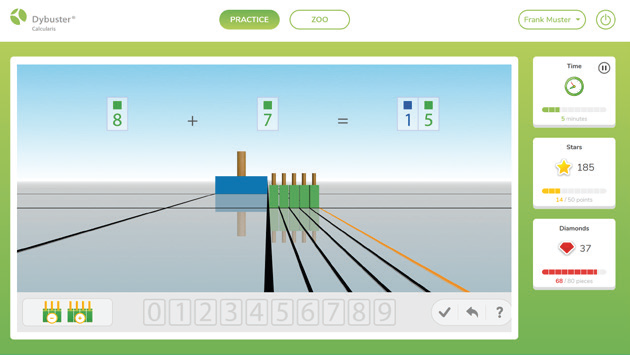Calcularis supports the development of regions of the brain involved in processing mathematical tasks.
In just one minute, get an insight into how Calcularis works and why it is so efficient for learning how to solve your math problems!
When the Brain Doesn’t Want to Calculate
For those who suffer from mathematical weaknesses, or “dyscalculia”, numbers are often meaningless. Making estimations is difficult, as is comparing different values. Performing calculations is all but impossible. This impairment has substantial negative impacts on a sufferer’s performance at school and later on in their working life.
During childhood, certain regions of the brain develop to specialise in the processing of numbers and mathematical tasks. For children with dyscalculia, this natural development is delayed; sometimes, it largely fails to occur at all. Calcularis offers a new and unique way of promoting essential learning and maturation processes in the brain. It combines modern findings
from developmental psychology and neuroscience with tried-and-tested principles from the fields of information theory and computer science.
Custom-Tailored Training
Calcularis adapts its learning content to suit the capabilities and speed of each individual user. This means that each user’s learning development is supported in exactly the areas where their difficulties lie. Personalised training modules offer learners a play-based way to overcome their arithmetic difficulties.
» 48 different learning games improve the neuronal processing of numbers and the user’s comprehension of a mental number line.
» The software trains addition, subtraction, multiplication and division operations in a 0-1000 range.
» The software lays essential foundations for the acquisition of more advanced mathematical skills.
Scientific studies have shown that targeted training leads to neuroplastic changes in the brain. After just three months of Calcularis training, learners can solve over 35% more maths problems correctly and at the same time significantly reduce their anxiety about maths.
Game-Based Learning
Calcularis guides the user’s learning. Where necessary, it also repeats certain content or exercises to ensure that learned material is consolidated and retained. Progress is displayed in the form of a friendly animation. As a reward, younger users can purchase animals for a virtual zoo, increasing their motivation and enhancing their enjoyment in learning.


